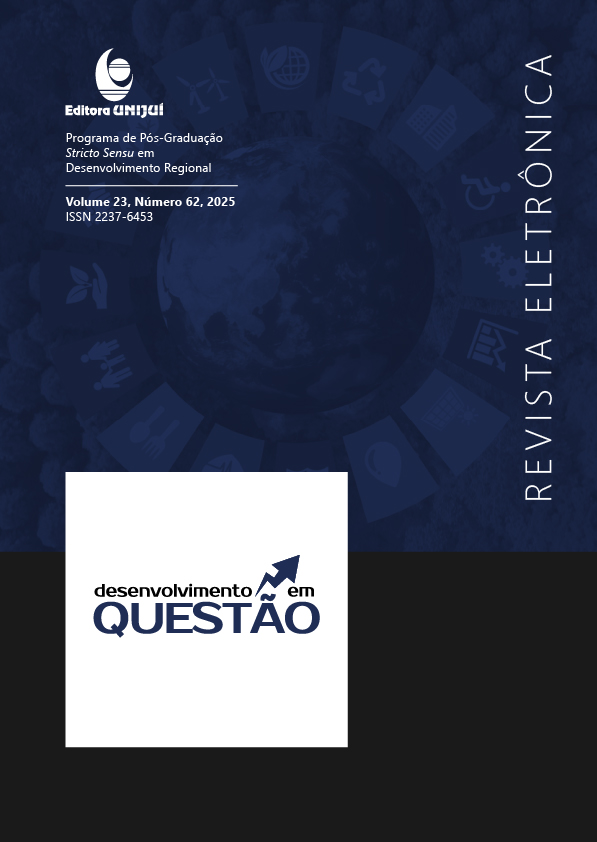The impact of climate change on the efficiency of agricultural production in Paraná's microregions (2001/2021)
DOI:
https://doi.org/10.21527/2237-6453.2025.62.16965Keywords:
Climate change, Agricultural productivity, Productive efficiencyAbstract
The article investigates the influence of climate change on agricultural production in Paraná between 2001 and 2021, focusing on the efficiency of microregions. Using climatic and agricultural data, it adopts the DEA and Malmquist Index methodologies for the analyses. The results indicate alternative impacts of climate variables on efficiency, with a positive or negative effect on regions. It is concluded that climate change influences technical progress. The study addresses similar research in other regions and highlights the importance of adaptation and productivity growth in adverse climate contexts. Limitations are presented, which include the data horizon and economic factors not considered. The research contributes to the theoretical and practical understanding of the relationship between climate and agricultural productivity, providing recommendations for decision-making and suggesting future expansions in the analysis.
References
BANKER, R. D., CHARNES, A. e COOPER, W. W. (1984). Some models for estimating technical and scale inefficiencies in Data Envelopment Analysis, Management Science, 30 pp. 1078-1092.
CHRIST, G. D.; ALVES, L. R.; EBERHARDT, P. H. C. Análise da base de exportação das mesorregiões paranaenses entre 2001 e 2021. Economia & Região, [S. l.], v. 11, n. 2, p. 173–194, 2023. DOI: 10.5433/2317-627X.2023.v11.n2.47225. Disponível em: https://ojs.uel.br/revistas/uel/index.php/ecoreg/article/view/47225. Acesso em: 19 ago. 2023.
COELLI, T. A guide to DEAP version 2.1: a data envelopment analysis (computer) program. Centre for Efficiency and Productivity Analysis, University of New England, Australia, v. 96, n. 08, p. 1-49, 1996.
SILVA, F. P.; VIEIRA FILHO, J. E. R. Crescimento agrícola, eficiência técnica e sustentabilidade ambiental. Brasília: Ipea, 2019. (Texto para Discussão, n. 2445).
FAO. 2018. The future of food and agriculture – Alternative pathways to 2050. Rome. 224 pp.
FÄRE, R.; GROSSKOPF, S.; NORRIS, M.; ZHANG, Z. (1994). “Productivity growth, technical progress, and efficiency change in industrialized countries”, American Economic Review, 84, pp. 66-83.
FERREIRA, C. M. C.; GOMES, A. P. Introdução à Análise Envoltória de dados: teoria, modelos e aplicações. Viçosa, MG: Editora UFV, 2009.
FUSCO, G. et al. The environmental impact of agriculture: An instrument to support public policy. Ecological Indicators, v. 147, 1 mar. 2023.
GHAFFARI, A.; COOK, H. F.; LEE, H. C. Climate change and winter wheat management: a modelling scenario for south eastern England. Climatic Change, n. 55, p. 509-533, 2002.
GUO, H. et al. The impact of climate change on the efficiency of agricultural production in the world’s main agricultural regions. Environmental Impact Assessment Review, v. 97, 1 nov. 2022.
INSTITUTO BRASILEIRO DE GEOGRAFIA E ESTATÍSTICA (IBGE). Censo Demográfico, 2022. Disponível em: https://censo2022.ibge.gov.br/panorama. Acesso em: 22/08/2023.
INSTITUTO BRASILEIRO DE GEOGRAFIA E ESTATÍSTICA (IBGE). Cidades e Estados. Disponível em: https://www.ibge.gov.br/cidades-e-estados/pr/. Acesso em: 19 ago. 2023.
INSTITUTO BRASILEIRO DE GEOGRAFIA E ESTATÍSTICA (IBGE). Produto Interno Bruto dos Municípios, 2020. Disponível em: https://www.ibge.gov.br/estatisticas/economicas/contas-nacionais/9088-produto-interno-bruto-dos-municipios.html?=&t=sobre>. Acesso em: 22/08/2023.
IPEA. Ipea - Objetivos do Desenvolvimento Sustentável. Disponível em: https://www.ipea.gov.br/ods/index.html. Acesso em: 11 ago. 2023.
JEDER, H. Total agricultural productivity in the Mediterranean region using the Malmquist index approach. New Medit, v. 22, n. 2, p. 51–61, 23 jun. 2023.
JONES, P. G.; THORTON, P. K. The potential impacts of climate change on maize production in Africa and Latin America in 2055. Global Environmental Change, n. 13, p. 51-59, 2003.
MARIANO, E. B. Conceitos básicos de análise de eficiência produtiva. XII Simpósio de Engenharia de Produção, SIMPEP, 2007.
MONTEIRO, J. E. B. A. Agrometeorologia dos Cultivos: o fator meteorológico na produção agrícola. 01. ed. Brasília, DF: Instituto Nacional de Meteorologia, 2009. v. 01. 530p.
PARRY, M. L.; ROSENZWEIG, C.; IGLESIAS, A.; LIVERMORE, M.; FISCHER, G. Effects of climate change on global food production under SRES emissions and socio-economic scenarios. Global Environmental Change, n. 14, p. 53-67, 2004.
RATTIS, L., BRANDO, P.M., MACEDO, M.N. et al. Climatic limit for agriculture in Brazil. Nature Climate Change, v. 11, n. 12, p. 1098–1104, 1 dez. 2021.
SIMEPAR (Sistema Meteorológico do Paraná). (2023). Dados Meteorológicos.
SUN, R.; LIU, X.; LI, D.; ZHUANG, J.; QI, S.; MENG. B.; LIU, M. Optimization of China’s pig production system to reduce environmental impacts based on a data envelopment and life cycle analysis model. Resources, Conservation and Recycling, v. 185, 1 out. 2022.
Downloads
Published
How to Cite
Issue
Section
License
Copyright (c) 2025 Rogério Ribeiro, Gabriela Daiana Christ, Jefferson Andronio Ramundo Staduto

This work is licensed under a Creative Commons Attribution 4.0 International License.
By publishing in Revista Desenvolvimento em Questão, authors agree to the following terms:
All works are published under the Creative Commons Attribution 4.0 International License (CC BY 4.0), which allows:
Sharing — to copy and redistribute the material in any medium or format;
Adaptation — to remix, transform, and build upon the material for any purpose, even commercially.
These permissions are irrevocable, provided that the following terms are respected:
Attribution — authors must be properly credited, a link to the license must be provided, and any changes made must be indicated.
No additional restrictions — no legal or technological measures may be applied that legally restrict others from doing anything the license permits.
Notices:
The license does not apply to elements that are in the public domain or covered by legal exceptions.
The license does not grant all necessary rights for specific uses (e.g., image rights, privacy, or moral rights).
The journal is not responsible for the opinions expressed in the articles, which are the sole responsibility of the authors. The Editor, with the support of the Editorial Board, reserves the right to suggest or request modifications when necessary.
Only original scientific articles presenting research results of interest that have not been previously published or simultaneously submitted to another journal with the same purpose will be accepted.
Mentions of trademarks or specific products are intended solely for identification purposes and do not imply any promotional relationship by the authors or the journal.
License Agreement (for articles published from 2025 onward): Authors retain the copyright to their article and grant Revista Desenvolvimento em Questão the right of first publication.











